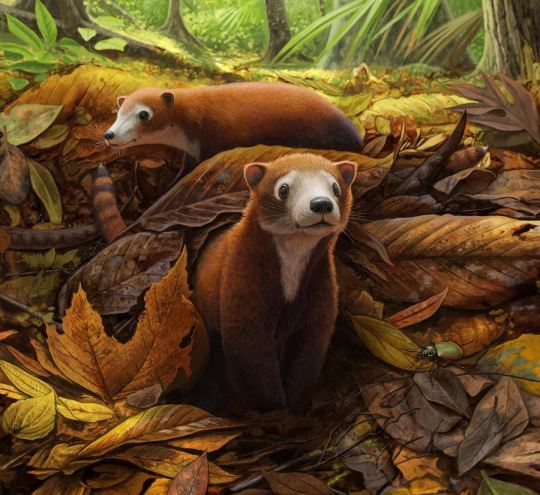#Periptychidae
Explore tagged Tumblr posts
Text

Skull of a new periptychid mammal from the lower Paleocene Denver Formation of Colorado (Corral Bluffs, El Paso County)
Lucas N. Weaver, Jordan W. Crowell, Stephen G. B. Chester & Tyler R. Lyson
Abstract
The Periptychidae, an extinct group of archaic ungulates (‘condylarths’), were the most speciose eutherian mammals in the earliest Paleocene of North America, epitomizing mammalian ascendency after the Cretaceous–Paleogene (K–Pg) mass extinction. Although periptychids are mostly known from fragmentary gnathic remains, the Corral Bluffs area within the Denver Basin, Colorado, has yielded numerous exceptionally well-preserved mammalian fossils, including periptychids, from the earliest Paleocene. Here we describe a partial cranium and articulated dentaries plus an additional unassociated dentary fragment of a small-bodied (~273–455 g) periptychid from ca. 610 thousand years after the K–Pg mass extinction (Puercan 2 North American Land Mammal ‘age’) at Corral Bluffs. Based on these new fossils we erect Militocodon lydae gen. et sp. nov. The dentition of M. lydae exhibits synapomorphies that diagnose the Conacodontinae, but it is plesiomorphic relative to Oxyacodon, resembling putatively basal periptychids like Mimatuta and Maiorana in several dental traits. As such, we interpret M. lydae as a basal conacodontine. Its skull anatomy does not reveal clear periptychid synapomorphies and instead resembles that of arctocyonids and other primitive eutherians. M. lydae falls along a dental morphocline from basal periptychids to derived conacodontines, which we hypothesize reflects a progressive, novel modification of the hypocone to enhance orthal shearing and crushing rather than grinding mastication. The discovery and thorough descriptions and comparisons of the partial M. lydae skull represent an important step toward unraveling the complex evolutionary history of periptychid mammals.
Read the paper here:
Skull of a new periptychid mammal from the lower Paleocene Denver Formation of Colorado (Corral Bluffs, El Paso County) | Journal of Mammalian Evolution (springer.com)
138 notes
·
View notes
Text
Meet the newly discovered species Militocodon lydae: Thought to be about the size of a rat and weighing up to 455 grams or 16 ounces, this small mammal is the likely ancestor of all modern hoofed animals, called ungulates. The animal would have lived around 65 million years ago, appearing just after the extinction of the dinosaurs, and was identified from part of a skull and jawbone recovered from the Corral Bluffs, a fossil site in Colorado. According to the researchers behind the discovery, the creature fills some important gaps in our knowledge of the Periptychidae family of early mammals, which ascended after the dinosaurs' departure.
Continue Reading.
114 notes
·
View notes
Text
Una specie di mammifero appena scoperta ha vissuto 610.000 anni dopo l'estinzione dei dinosauri
Una illustrazione di come poteva apparire Militocodon lydae. Paleontologi del Denver Museum of Nature & Science, della Kent State University, dell’Università del Michigan e della City University di New York hanno scoperto i resti fossili di una specie di mammifero che viveva sulla Terra circa 65,5 milioni di anni fa. La specie appena scoperta faceva parte dei Periptychidae, un gruppo di animali…

View On WordPress
0 notes
Text

Beornus
Beornus — вимерлий рід периптихідових «конділяртрів», який жив у Північній Америці в палеоцені. Конділяртри або стародавні копитні (лат. Condylarthra, від др.-грец. κόνδῠλος — кулак і ἄρθρον — суглоб, за формою таранної кістки), — збірна поліфілетична група вимерлих ссавців, фактично сміттєвий таксон для об’єднання «архаїчних копитних», що жили в епоху палеогену в Америці, Євразії та ��фриці.…
Повний текст на сайті "Вимерлий світ":
https://extinctworld.in.ua/beornus/
#beornus#periptychidae#condylarthra#paleoart#beornus honeyi#science#north america#wyoming#paleocene#paleontology#paleogene#usa#africa#extinct animals#prehistory#animals#prehistoric#scientific illustration#art#палеоарт#палеонтологія#вимерлі тварини#доісторичні тварини#ukraine#україна#українська мова#tumblr#тварини#asia
14 notes
·
View notes